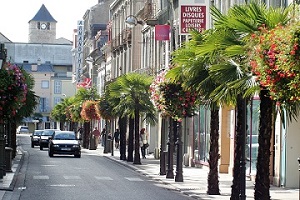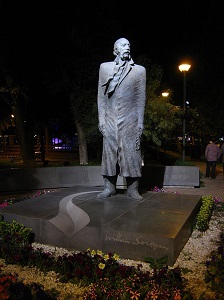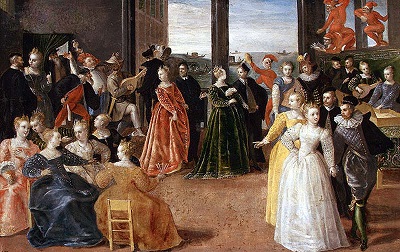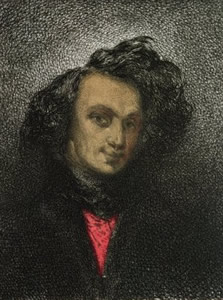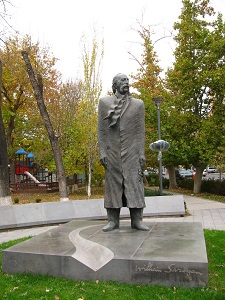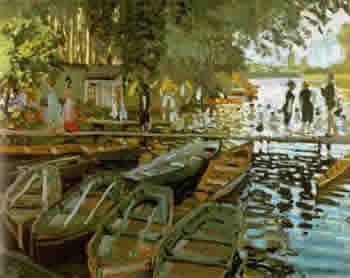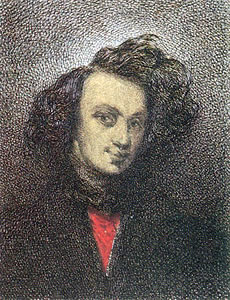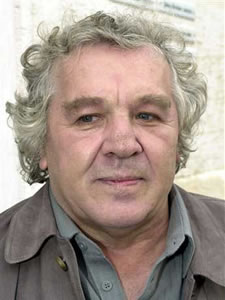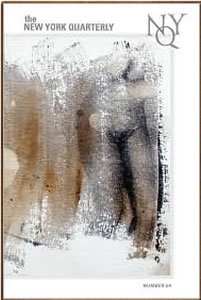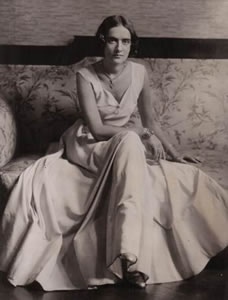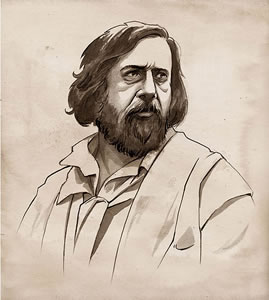De Duitse dichter en schrijver Wolfgang Hilbig werd geboren in Meuselwitz op 31 augustus 1941. Zie ook alle tags voor Wolfgang Hilbich op dit blog.
Palimpsest
Die Klage? – Sie liegt still über den Dächern im August –
wir haben sie nicht vernommen sie hat uns vernommen.
Lautlos haben sich die Tage geordnet: sie schwimmen
weit hinaus der Sommer ist entlassen aus der Macht.
Ein Sprung ein unsichtbarer Haarriss im Azur
hoch über uns: mißtönend Glas
Ein Sicheln von Zikaden
hoch über uns im verschleuderten Licht …
vorbei das Jahrhundert mehr als hundert Jahre alt –
das Jahrhundert der Männer: am Ende verkommen
zu Neurasthenie. Der Rubikon ist überschritten!
Und bald gehört die Stadt den Stimmen unbekannter Sterne –
Der Hafen glimmt: ein Licht zur Ausfahrt angeschirrt …
Ausfahrt unentwegt wenn das Jahr zu enden anfängt
Bei Tag und Nacht herrscht aufgeräumte Fahrt von Farben
Ausfahrt von Sonnen still über den Dächern im August
Sommers Ausfahrt all jene erbleichenden Bläuen hinab
Und über die maßlosen Wasserfälle der Horizonte hinab –
o diese Gleitbahnen der Zeit diese unsichtbaren Ränder
hoch über uns in der großen Lichtvergeudung vor Abend –
und wir allein sind festgemacht in unentwegter Flaute:
wir haben die Klage den sterblichen Göttern überlassen.
Hier ist der Hafen ohne Hoffnung auf die Wiederkehr der Schiffe –
August vorbei
o noch ein letzter Tag vor dem September
der eintrifft wie ein Abend in wüster Verstimmung
dessen Sonne noch einmal die Zwietracht von Anfängen sät –
Anfänge die in schneller Flucht durch alle Flure eilen
ein Ende suchend in der Wirrsal von Treppenhäusern ohne Mitte
vor dem Rotbraun von Brandmauern aufgetakelt mit Schrott
wo wir entmannt sind festgemacht im Staub der Etagen
und es tritt der Mond auf oben am
Rand des Jahrhunderts
konturlos glimmend
ein optischer Zufall vor Nachtbeginn –
und nun hebt ein toter Baum seine Kandelaber herauf
und zündet sich an: die schwarze Explosion des September
unaufhörlich in den Hinterhöfen tief wie Brunnen ohne Widerhall.
Ach welch düsteres Geäderzeichen für das Jahrhundert –
dieser Gespensterbaum dieser entgeisterte Illuminator
der jetzt die Lichter der Sterne anbrennt vielarmig verzweigt
dem Ende des Sommers zu leuchten dem Ende der mannhaften Fahrt.
Und er schreibt seine unlesbaren Runen in den leeren Azur …
Umschrift des Sommers
Sie bedeckt den Kurs der Männer
Löst auf der Sonne Ausgeburt entmachtet Ziel und Klage …
Wir haben sie den Zikaden überlassen dem irren Abhub ihres Lieds –
Der Rubikon ist überschritten.
Dunstküste. Lautlos ziehn die Tage im Geleit.
Sie schwinden weit ins Offne mit dem Strom. Am Abend
Das flüchtige Gelichter der Wasser. Davor ein Baum im Rauch
Im kurzen Atem der Zikaden die sich widerrufen.
Und dann die Nacht in der wir nicht mehr sichtbar sind.
Wolfgang Hilbig (31 augustus 1941 – 2 juni 2007)
De Amerikaanse dichter, criticus en tijdschriftredacteur Raymond P. Hammond werd geboren op 31 augustus 1964 in Roanoke, Virginia. Zie ook alle tags voor Raymond P. Hammond op dit blog.
Uit: The New York Quarterly, Number 64
“Poetry proved upon the pulses, the pulse of life, the pulse of the l
ife of the poet. How can one experience a poem if the poet has not experienced life? One of the greatest achievements of the last thirty some years of The New York Quarterly is the close association of its poets and poetry to the real world. The vast majority of the poems published in The New York Quarterly over those years were born in the dirt, grime or rainbow of reality. The poets have come from diverse backgrounds and experiences: from postal workers, like Bukowski, to lawyers, to cops, to factory workers, to strippers, to housewives; real people leading real lives.
In his Letters to a Young Poet, Rainer Maria Rilke admonishes: “Write about what your everyday life offers you,” but then he goes on to interject, “if your everyday life seems poor, don’t blame it; blame yourself.” We have as much responsibility to live a life to “the ripest, fullest experience that one is capable,” as John Keats said, as we do to writing the best poetry. In fact, the two are inseparable.
To be a poet like Archilochos who, as a mercenary, led troops into battle only to leave his shield behind and then write a poem about it:
Some Saian mountaineer
Struts today with my shield.
I threw it down by a bush and ran
When the fighting got hot.
Life seemed somehow more precious.
It was a beautiful shield.
I know where I can buy another
Exactly like it, just as round.
To know that life is precious, poetry is precious, and when to fight and when to run! To be the Renaissance of Renaissance. Not just to write a poem to be writing a poem, but to write the poetry of poetry, to be a man or woman among mankind. As William Packard always reminded us, Aeschylus’s epitaph only mentioned his bravery at the Battle of Marathon—not that he was a great playwright.
Keeping our poetry and ourselves real, having lives, living them, remembering that the sunset, sunrise, midday on a Manhattan sidewalk, the human touch of the one true lover, a major league baseball game, children, dogs barking in the alleyway, a dying father, scuba diving, working overtime, seafoam, moonbeams, dirty jobs, filthier sex, duty – are all poetry in and of themselves. It is up to us, the poets, to glean the beauty.
And then write.”
Raymond P. Hammond (Roanoke, 31 augustus 1964)
Boekomslag (Geen porttret beschikbaar)
De Engelse schrijfster Elizabeth von Arnim werd op 31 augustus 1866 geboren in Kirribilli Point in de buurt van Sydney. Zie ook alle tags voor Elizabeth von Arnim op dit blog.
Uit: The Solitary Summer
„May 2nd.—Last night after dinner, when we were in the garden, I said, “I want to be alone for a whole summer, and get to the very dregs of life. I want to be as idle as I can, so that my soul may have time to grow. Nobody shall be invited to stay with me, and if any one calls they will be told that I am out, or away, or sick. I shall spend the months in the garden, and on the plain, and in the forests. I shall watch the things that happen in my garden, and see where I have made mistakes. On wet days I will go into the thickest parts of the forests, where the pine needles are everlastingly dry, and when the sun shines I’ll lie on the heath and see how the broom flares against the clouds. I shall be perpetually happy, because there will be no one to worry me. Out there on the plain there is silence, and where there is silence I have discovered there is peace.”
“Mind you do not get your feet damp,” said the Man of Wrath, removing his cigar.
It was the evening of May Day, and the spring had taken hold of me body and soul. The sky was full of stars, and the garden of scents, and the borders of wallflowers and sweet, sly pansies. All day there had been a breeze, and all day slow masses of white clouds had been sailing across the blue. Now it was so still, so motionless, so breathless, that it seemed as though a quiet hand had been laid on the garden, soothing and hushing it into silence.
The Man of Wrath sat at the foot of the verandah steps in that placid after-dinner mood which suffers fools, if not gladly, at least indulgently, and I stood in front of him, leaning against the sun-dial.
“Shall you take a book with you?” he asked.
“Yes, I shall,” I replied, slightly nettled by his tone. “I am quite ready to admit that though the fields and flowers are always ready to teach, I am not always in the mood to learn, and sometimes my eyes are incapable of seeing things that at other times are quite plain.”
“And then you read?”
“And then I read. Well, dear Sage, what of that?”
But he smoked in silence, and seemed suddenly absorbed by the stars.
“See,” he said, after a pause, during which I stood looking at him and wishing he would use longer sentences, and he looked at the sky and did not think about me at all, “see how bright the stars are to-night. Almost as though it might freeze.”
Elizabeth von Arnim (31 augustus 1866 – 9 februari 1941)
De Amerikaanse dichter en schrijver William Saroyan werd geboren op 31 augustus 1908 in Fresno, Californië. Zie ook alle tags voor William Saroyan op dit blog.
Uit: The Time Of Your Life
“In the time of your life, live — so that in good time there shall be no ugliness or death for yourself or for any life your life touches. Seek goodness everywhere, and when it is found, bring it out of its hiding-place and let it be free and unashamed. Place in matter and in flesh the least of the values, for these are things that hold death and must pass away. Discover in all things that which shines and is beyond corruption. Encourage virtue in whatever heart it may have been driven into secrecy and sorrow by the shame and terror of the world. Ignore the obvious, for it is unworthy of the clear eye and the kindly heart. Be the inferior of no man, nor of any man be the superior. Remember that every man is a variation of yourself. No man’s guilt is not yours, nor is any man’s innocence a thing apart. Despise evil and ungodliness, but not men of ungodliness or evil. These, understand. Have no shame in being kindly and gentle, but if the time comes in the time of your life to kill, kill and have no regret. In the time of your life, live — so that in that wondrous time you shall not add to the misery and sorrow of the world, but shall smile to the infinite delight and mystery of it.”

William Saroyan (31 augustus 1908 – 18 mei 1981)
De Franse dichter en schrijver Théophile Gautier werd op 31 augustus 1811 geboren in Tarbes (departement Hautes-Pyrénées. Zie ook mijn blog van 31 augustus 2006
A deux beaux yeux
Vous avez un regard singulier et charmant ;
Comme la lune au fond du lac qui la reflète,
Votre prunelle, où brille une humide paillette,
Au coin de vos doux yeux roule languissamment ;
Ils semblent avoir pris ses feux au diamant ;
Ils sont de plus belle eau qu’une perle parfaite,
Et vos grands cils émus, de leur aile inquiète,
Ne voilent qu’à demi leur vif rayonnement.
Mille petits amours, à leur miroir de flamme,
Se viennent regarder et s’y trouvent plus beaux,
Et les désirs y vont rallumer leurs flambeaux.
Ils sont si transparents, qu’ils laissent voir votre âme,
Comme une fleur céleste au calice idéal
Que l’on apercevrait à travers un cristal
La chimère
Une jeune chimère, aux lèvres de ma coupe,
Dans l’orgie, a donné le baiser le plus doux
Elle avait les yeux verts, et jusque sur sa croupe
Ondoyait en torrent l’or de ses cheveux roux.
Des ailes d’épervier tremblaient à son épaule
La voyant s’envoler je sautai sur ses reins ;
Et faisant jusqu’à moi ployer sou cou de saule,
J’enfonçai comme un peigne une main dans ses crins.
Elle se démenait, hurlante et furieuse,
Mais en vain. Je broyais ses flancs dans mes genoux ;
Alors elle me dit d’une voix gracieuse,
Plus claire que l’argent : Maître, où donc allons-nous ?
Par-delà le soleil et par-delà l’espace,
Où Dieu n’arriverait qu’après l’éternité ;
Mais avant d’être au but ton aile sera lasse :
Car je veux voir mon rêve en sa réalité.
Théophile Gautier (31 augustus 1811 – 23 oktober 1872
Illustratie door Laurent Paturaud
Zie voor bovenstaande schrijversook mijn blog van 31 augustus 2007 en ook mijn blog van 31 augustus 2008.

